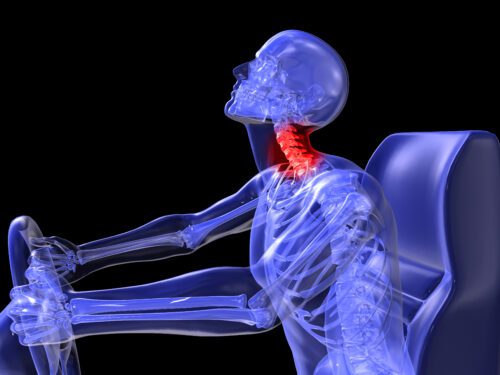
Symptoms of whiplash do not always manifest right after a wreck. The shock and adrenaline after a terrifying experience such as a car crash can mask your symptoms.
Whiplash can cause injuries to the discs in your cervical spine or even damage the nerve roots in your cervical spine. That is why getting medical treatment right after a wreck is essential. This way, a doctor can check for any hidden injuries.
Below, the attorneys at MG Law describe the delayed symptoms of whiplash after a car accident. We also discuss whiplash treatments, some of which your doctor may use in your case. Contact our office if you have specific questions about whiplash from a car accident and how to file a compensation claim.
Delayed Whiplash Symptoms
Whiplash can happen when the neck moves rapidly backward and forward, such as in a car collision. The symptoms of whiplash can be delayed after a car accident because an accident evokes adrenaline which masks pain. Once the adrenaline has worn off, you may begin to feel the symptoms of whiplash.
There are many potential signs of whiplash. Some of the most frequent symptoms of delayed whiplash are:
- Headaches,
- Jaw pain,
- Shoulder pain,
- Neck pain,
- Ringing in the ears,
- Dizziness,
- Numbness in your arms or legs,
- Irritability,
- Blurred vision, and
- Memory loss.
You must seek medical attention as soon as possible after a car accident to determine if you have whiplash or another injury. A qualified healthcare provider can diagnose you and provide an appropriate treatment plan. This will also help you document your injuries if you decide to file a claim.
What Should a Victim Do If They Suspect They Have Whiplash After a Car Accident?
The first thing you should do after an automobile accident is to seek medical attention. You will likely need to undergo a physical examination and imaging tests to determine the appropriate treatment for your injuries. Your doctor will also collect a complete patient history.
What Should I Expect from a Physical Exam?
Whiplash examinations usually take little time, but they are essential to diagnose whiplash. Your physician will have you move your neck and head and see how you perform. Your doctor will likely examine the following:
- Tenderness in your neck or back;
- Your strength and reflexes;
- Your range of motion; and
- The degree of motion that results in pain.
During the exam, you will want to tell your doctor about any pain you experience. If you have whiplash, you will likely have decreased mobility and trouble turning your head. You should also tell your doctor about any particularly painful or sore areas.
What Imaging Tests Might I Need?
Imaging tests can help your physician check for medical conditions that may exacerbate your neck pain. You may need to undergo one or more of these tests. Common imaging tests include the following:
- A magnetic resonance imaging (MRI) scan,
- A bone scan,
- A radiograph or an X-ray, and
- A computerized tomography (CT) scan.
Imaging tests can assist your doctor in diagnosing you. These scans allow your doctor to better understand which parts of your body might have sustained injuries.
What Treatment Could My Doctor Recommend?
There are various possible treatment options for whiplash after a car accident. These may include medication, injections, or something as simple as applying ice or heat to your neck. Consult with a qualified physician before starting any particular treatment method.
Be sure you keep copies of any treatment plans your doctor recommends. This way, you can refer back to them when you experience symptoms. These may also be helpful if you choose to bring a claim.
Use a Neck Brace
Your doctor may recommend a neck brace to help you recover from the symptoms of whiplash. Be sure to use it for only as long as your doctor directs. Using a soft collar for too long could prolong your recovery time.
Apply Ice
Another treatment your doctor may recommend to reduce pain without medication is to apply ice to the affected area. You can use a cold compress on the area to minimize inflammation and muscle spasms. Your doctor may recommend applying ice in 15-minute increments every three hours. Ice is a great pain management tool to use before switching to heat.
Use Moist Heat
Your doctor may suggest that you apply heat after using ice. They may tell you to apply heat for 15 minutes about every three hours to help relieve pain. Some common ways people apply moist heat include getting into a hot shower or applying a moist heat wrap.
Rest
Sometimes, something as simple as rest can work to reduce your pain. Your doctor may recommend rest for one or two days or longer.
Prescription Medication
Your physician could prescribe prescription drugs if you have significant pain. For instance, you may need muscle relaxant medication. Muscle relaxants help lower your pain levels and release tight muscles.
Your doctor may also prescribe painkillers. Take these as directed and discuss any possible side effects with your doctor.
Over-the-Counter (OTC) Pain Medication
You can also ask your doctor which OTC medications will work best to reduce your pain. Some examples of OTC pills you might take include ibuprofen and naproxen. Ensure that you check with your physician before taking them on a regular basis.
Injections
Your doctor might also recommend a lidocaine injection. Lidocaine is a numbing agent that can reduce your pain. It may even allow you to participate in physical therapy.
Other types of injections to treat whiplash include cervical epidural injections and occipital nerve blocks. These injections could be a good choice if your medication is not addressing your pain.
Why Is Whiplash Pain Often Delayed?
Whiplash pain after a car collision can be delayed for several reasons. One potential reason for delayed pain is that your body reacts to stress by increasing your adrenaline and endorphin levels. When you have a rise in adrenaline, you may have a reduction in pain or a complete lack of pain. Endorphins also work to reduce your pain temporarily. When these wear off, your pain then emerges.
Additionally, whiplash pain can take time to develop. The body may swell near the site of the injury over an extended period of time. Thus, you may not feel any signs of whiplash for days after the accident. Sometimes, individuals do not feel symptoms for months.
We Can Help
At MG Law, we are here to help you if you have suffered whiplash in an accident. Our lawyers can aid you with filing your claim so that you can receive the compensation you need to cover your medical expenses and other costs. Our team deeply cares about your well-being. Call our office to request a free consultation today. You can also complete our online form.

